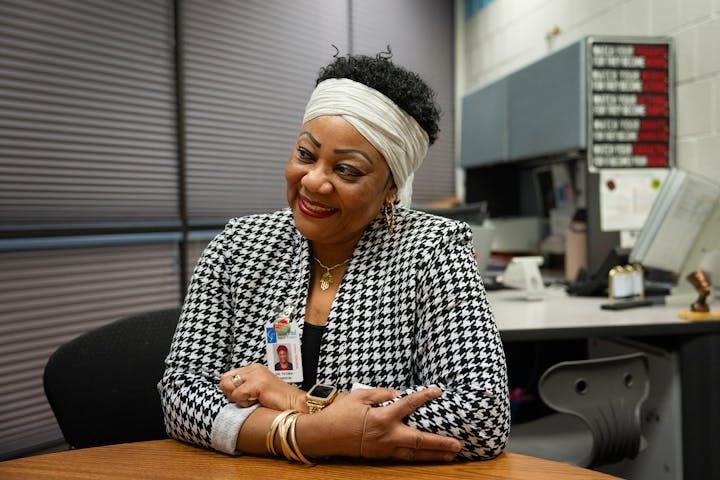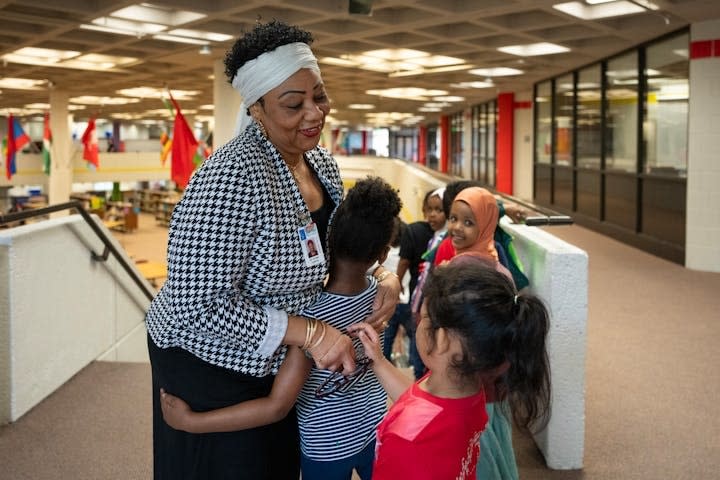A St. Paul school was in trouble, but its principal turned it around by listening to parents
The second-graders laughed as they placed the worms — some more quickly than others — in small pots of soil last week at Highwood Hills Elementary School in St. Paul.
It was a lesson in irrigation and how worms open channels in the soil.
"Watch the way they burrow down," said Carolyn Chisholm, the school's polytechnic coordinator, as students huddled around the action.
Once slated for closure, Highwood Hills has new life as a polytechnic program with lessons in technology, engineering and agriculture, and Principal Fatima Lawson — who was there, too, with the second-graders, leaning in and watching — has received national recognition for its turnaround.
She is a recipient of the 2024 National Distinguished Principal Award presented by the National Association of Elementary School Principals.
Lawson, a native of Nigeria, leads a school that is nearly 90% Somali, Karen and Hispanic. She is being recognized for her innovative approach to giving families what they want.
In 2021, Highwood Hills was at risk of being shuttered, but ultimately was saved by school board members then weighing various elements of a proposed district-wide redesign.
How the school would proceed, however, was the question, and after deciding against a new language-and-culture emphasis, Lawson and the leadership team began surveying families for answers.
Somali refugees said they did not come to America to have kids learn their own culture and language.
"We want them to be medical doctors," Lawson quoted them as saying. "We want them to be engineers. We want them to be lawyers and politicians."
The Karen community said: "We are farmers."
As for the Hispanic families, they were tired of hearing about "college, college, college all the time," she said, only to obtain degrees but not jobs. Many wanted their kids to learn something more hands-on, perhaps landscaping or other trades, Lawson said, and be positioned to take over family businesses.
Polytechnic, then, was the answer, and a three-year plan was assembled that will have the program fully operating in the 2024-25 school year.
Enrollment at the East Side school has exceeded 2023-24 projections by nearly 100 students — it now has 277 — with 47 newcomers signed up thus far for 2024-25.
Mariam Alam-Zaki, who is from Afghanistan and has three children at Highwood Hills, said she came to the United States in 2021 and went to the school wondering: "How are they going to treat my kids? How are they going to teach my kids?"
She couldn't be happier.
"They are very helpful. They are very respectful. They are very kind," she said. "I feel like home."
'My life's purpose'
Duane Dutrieuille, principal of Hazel Park Preparatory Academy in St. Paul, who nominated Lawson for the honor, commended her for her attention to diversity and inclusion.
"She has worked tirelessly to ensure that every student, regardless of their background, has access to a high-quality education," he said.
As a child growing up in northern Nigeria, Lawson, too, needed a guiding hand while attending all-girls elementary and secondary boarding schools.
In Nigeria, she said, the education of girls was not a priority. But her principal, a British missionary, saw potential in Lawson, who was an avid reader, and arranged for her to take a college exam. Thinking her future was that of a wife and mother, Lawson went home and was surprised to learn via a newspaper story that she'd been accepted to a university.
She said the principal instilled in her the drive to "make education part of my life's purpose."
Her team at Highwood Hills has cultivated partnerships with groups like Science from Scientists, Project Scientist, Minnesota Academy of Science (FORSE) and Youth Farm.
Youth Farm has worked with the fourth- and fifth-graders to build planter boxes, and is planning to help them plant food gardens on Friday.
In the meantime, Chisholm said, the smaller kids are tending to their worms and preparing to write a letter to the older students making a case for putting them in their gardens.
She then paused.
"I don't know if Dr. Lawson was excited about the worms," Chisholm said.
"I was not," Lawson said. "But in the spirit of collaboration and learning, I said yes."




